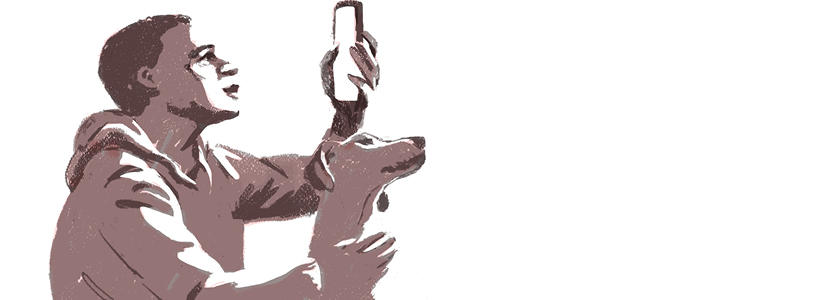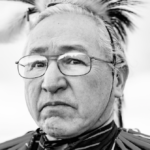
Native American people see themselves as part of the world. We are not above it but part of it. Among many Native peoples there is a saying: “We are all related.” This means between each other as humans but also to the world—and what happens to the world happens to us. We are caretakers and protectors of the water and earth.
Place is a concept, and is important to every ethnic and cultural group of the world. Place does not only mean the physical location you occupy; it also pertains to your identity within the place you occupy. Place includes everything surrounding you; it includes the mental, physical, emotional, and spiritual aspects of Native American identity found in the medicine wheel teachings. Place can change, as with the Native Americans here in the United States, but place can always be found again when the people understand that healing comes from identifying with a new place.
Native people need to identify with a location, but we have lost our locations. We have been moved from our homelands and relocated to reservations. Place for us has had many changes. We were first moved to the reservations, then from reservations to the cities where the majority of us now reside. Place finds its purpose in location and for Native people, it is the land where we make our homes that gives us purpose.
We have lost land and identity, but wherever we are there is land and a chance to identify once again with her. We call the land our Mother because it gives us everything we need to live. Without her we would die. She gives us water and food, from her comes our shelter and our garments for warmth. There is a cycle of life we respect; we know we are a part of this cycle. Before modern funeral rituals, our bodies were allowed to return to the land. The land is made up of our ancestors from the beginning of time—this is another reason we respect her.
We celebrate and give thanks for the earth and everything that is a part of it: the air, the water, the plants, the animals of the land, the birds and those creatures that live in the water, the rocks and sand for the valleys and the mountains. The water on this planet is the only water we will ever have. When we pollute it we pollute ourselves. The air we breathe is for all of us—the plants, the animals, and the insects all use the same air. We need the air to be clean. The earth needs us to return to a respectful relationship for the healing of place.
I married a Navajo lady, so now our children’s identity is made up of two different places: Navajo of the Southwest and Potawatomi of the Great Lakes. Our five children have two Native heritages needing to find place. Lora and I have taught all our children to have a strong identity in both of their heritages. Their grandparents lived this example of strength. Whether they are in either location, the Great Lakes or the desert of the Southwest, we have place not only in land but in identity as two very proud Native peoples. Being from two different places, there is a verse in the Bible we live by: “Where you go, I will go, and where you stay I will stay. Your people will be my people and your God my God. And Your place will be my place” (Ruth 1:1–7).

Leonard “Casey” Church (DIS ’15, MAICS ’04) is a speaker, consultant, pastor, and author of Holy Smoke: The Contextual Use of Native American Ritual and Ceremony. He is a member of the Pokagon Band of Potawatomi Indians of Southwest Michigan.
Native American people see themselves as part of the world. We are not above it but part of it. Among many Native peoples there is a saying: “We are all related.” This means between each other as humans but also to the world—and what happens to the world happens to us. We are caretakers and protectors of the water and earth.
Place is a concept, and is important to every ethnic and cultural group of the world. Place does not only mean the physical location you occupy; it also pertains to your identity within the place you occupy. Place includes everything surrounding you; it includes the mental, physical, emotional, and spiritual aspects of Native American identity found in the medicine wheel teachings. Place can change, as with the Native Americans here in the United States, but place can always be found again when the people understand that healing comes from identifying with a new place.
Native people need to identify with a location, but we have lost our locations. We have been moved from our homelands and relocated to reservations. Place for us has had many changes. We were first moved to the reservations, then from reservations to the cities where the majority of us now reside. Place finds its purpose in location and for Native people, it is the land where we make our homes that gives us purpose.
We have lost land and identity, but wherever we are there is land and a chance to identify once again with her. We call the land our Mother because it gives us everything we need to live. Without her we would die. She gives us water and food, from her comes our shelter and our garments for warmth. There is a cycle of life we respect; we know we are a part of this cycle. Before modern funeral rituals, our bodies were allowed to return to the land. The land is made up of our ancestors from the beginning of time—this is another reason we respect her.
We celebrate and give thanks for the earth and everything that is a part of it: the air, the water, the plants, the animals of the land, the birds and those creatures that live in the water, the rocks and sand for the valleys and the mountains. The water on this planet is the only water we will ever have. When we pollute it we pollute ourselves. The air we breathe is for all of us—the plants, the animals, and the insects all use the same air. We need the air to be clean. The earth needs us to return to a respectful relationship for the healing of place.
I married a Navajo lady, so now our children’s identity is made up of two different places: Navajo of the Southwest and Potawatomi of the Great Lakes. Our five children have two Native heritages needing to find place. Lora and I have taught all our children to have a strong identity in both of their heritages. Their grandparents lived this example of strength. Whether they are in either location, the Great Lakes or the desert of the Southwest, we have place not only in land but in identity as two very proud Native peoples. Being from two different places, there is a verse in the Bible we live by: “Where you go, I will go, and where you stay I will stay. Your people will be my people and your God my God. And Your place will be my place” (Ruth 1:1–7).
Leonard “Casey” Church (DIS ’15, MAICS ’04) is a speaker, consultant, pastor, and author of Holy Smoke: The Contextual Use of Native American Ritual and Ceremony. He is a member of the Pokagon Band of Potawatomi Indians of Southwest Michigan.
Wilmer Villacorta, associate professor of intercultural studies, considers how we might have a fresh understanding of place in light of God’s divine presence.